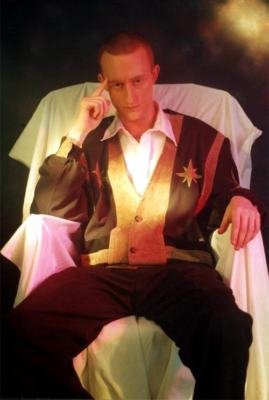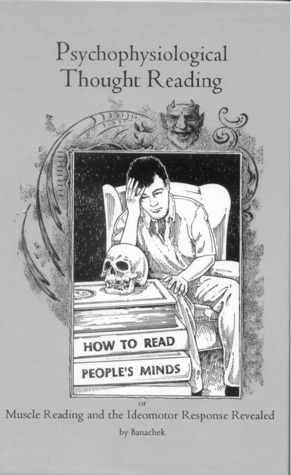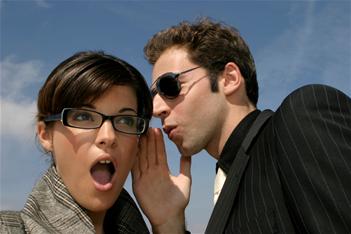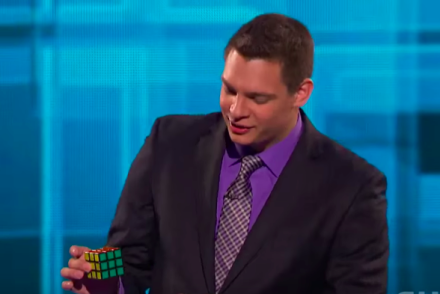For the budding magician, developing your skills to a high level of competency is paramount to becoming one of the best in your field.
Wowing onlookers with a knowledge of tricks and abilities is one thing - but learning how to develop an all-around knowledge of magical arts is entirely different.
Below, you can find our entire guide to mind power, something that will significantly enhance your magic.
A History of Mind Power

The more popular idea of what Mentalism is came together sometime in the latter mid-point of the 19th century, about a decade after the Spiritualist movement was popularized in America.
Magicians began looking at ways of cashing in on this specific trend.
From this point on, we can see evidence of the earliest magic shows. They were probably replicating what hustlers had been already performing on the streets, and then decided to sell it as a show.
There were two kinds of characters that emerged at this point.
The first of these two were either single individuals, or a couple that made their living as show people, and provided a night of mind-bending, wondrous feats.
Some of them would incorporate Message Bearing style acts, in which the main act, or their onstage partner would channel answers to questions posed by audience members. This was done in a fashion very similar to what we have seen by many present-day psychics on television – think personalities such as John Edward and Sylvia Brown.
There were also other popular demonstrations using a variety of other impressive feats, with acts employing Clairvoyance, Telepathy, Hypnotism, and trickery involving Master Mind style acts (mnemonic mind, human calculator, lie detector, and so forth).
Alternatively, other acts demonstrated performances using similar methods, but centered on less of a showy approach. These acts catered more to the ‘Shut Eye’ side of the spectrum, as well as the Lecture Circuit. The Lecture Circuit was a type of performance in which demonstrations were carried out with an emphasis on creating an air of authenticity.
The latter of these two styles is still an extremely popular mode of operation, apparent in the business savvy of the late Robert Nelson as well as others of the same generation.
However, it must be noted that not every Lecturer into magic took on this perspective – many of them moving towards the route of Research and Psychology into human behavior instead.
Abilities, Traits & Schools of Thought

As we go deeper into our analysis of mind power, it would be wrong to forget just how much Mentalism has in common with real Psychic Development.
For those not in the know, maturing these skills hinges on the ability to improve one’s awareness and recall constantly.
Aside from this progression, a commonly-known aspect of development is gaining the required knowledge about the psychic forum - a dedication to learning what the different psychic abilities are, as well as having an understanding of the more analytical perspectives, including NeuroLinguistics and the nuances of Body Language.
Mind power is dependent upon believability, and the ways in which our claims can be validated.
The most useful method of validation comes from our integration of already existing information. This is the kind of information can be found via Google or other convenient means, and therefore is a prime candidate for our audiences to search for either before or during a live show.
Those that choose to take the more analytical road (such as NLP) truly owe it themselves, their craft and their audience to have a comprehensive idea of what they’re talking about.
This is because access to such insights is far too easy to get a hold of these days. Secondly, we are living in a time where the public is more educated than ever before in the course of human history.
Schools of Thought
As we said earlier, there are two main schools of thought to consider when it concerns mind power.
The older version of this discipline is actually an art form wherein the performer toes the line between theatre and making use of an angle that framed them as being an imposter.
However, the primary difference here is that they were not hustling individuals and taking them for all that they’re worth – as a conman would have
There are several gurus that thrive off of people's worship. Using instances such as someone’s watch stopping, for example, can be the impetus for our demonstration of our latent abilities (i.e. ‘our psychic power caused it’).
Whenever we perform, we act out everything as being authentic, instilling our practices with our own sense of wonder and belief, while bringing audiences into the fold in an immersive fashion. This enables them to feel closer to us, becoming a part of the encounter – thus investing themselves in our act.
The majority of Old School magicians still carry out Private Readings and Home PSI Parties.
Contrary to the belief of many, however, it is not because they can’t get work within the realms of showbiz, but more - a case of preference. This can span a multitude of different reasons, ranging from having beliefs or ideals misaligned with commercial magic, to not wanting to participate in the chaotic world of show business (not to mention the politics involved).
The brand-new School of Mentalism may be seen as two completely different things.
On one hand, there are showmen that display a distinctive feeling of savvy, providing high-energy performances mainly composed of Mental Magic due to its wide-ranging appeal.
Of course, proponents of this style are very much business-minded, bringing fun, enjoyable, and beguiling action front and center. Its other advantage is that it's a system folks feel safe with.
Alternatively, we have the more novel acts that spawned out of the late 1990's tidal wave started by those such as David Blaine. Looking at what he and his contemporaries actually bought to the art, we can see that it is comprised of a significant amount of Bizarre Magick, meshed together with conventional magic and a touch of Mentalism.
Derren Brown is a lot more focused on the Mentalism side, while Blaine has integrated facets of literal yogi plus shamanic rites as a part of his persona, which results in an expression of mysticism that ties in particularly well to New Age ideology.
Criss Angel’s developed a character more comparable to the rock-n-roll bad boy, often considered a safe expression of cultural taboos – prime for promotors striving to find a hook that grabs the public's interest.
Criss already had the foundations of that hook, he simply needed the pros to help him round it out and exploit it.
Abilities
This is very much the question many ask about mind power on many forums. It’s quite apparent (and unsurprising) that this art has found so many willing to take up its disciplines.
Cold Reading

This technique is a necessity. As mentioned before, the thing the public desires the most is the magician taking time to speak about them.
Despite what many assume, the idea of Reading People differs substantially when done on stage as a part of a Q&A or back and forth interaction compared to a one-on-one encounter.
The 3 foundation books that we suggest you purchase learn cold reading are, conveniently, all by the same author. These are: Cold Reading for Magicians, Psychometry from A-Z, and You Are a Rainbow - all by Richard Webster.
Another notable practitioner of Cold Reading is Herb Dewey, whose material deals with Private Reading methods, however, his approach is more suitable for intermediate to advance learners.
The same goes with the majority of Gene Nelson's and Ron Martin's work. Those interested in improving their tableside reading skills should purchase The Tarot Reader's Notebook (by Martin) and The Palm Readers Notebook.
Both of these are full of practical viewpoints, however, the Tarot Reader's Notebook will give you insight into how old school mentalism works when considering Readings. It’s often considered one of the most important pieces of work associated with this skill set and the old method of doing things.
Muscle Reading/Ideomotor Skills

These are largely ignored by a lot of people looking to develop their skills, despite them being among the most adaptable and powerful abilities available to us.
Practitioners looking to get into this should invest in Psychophysiological Thought Reading by Banachek, and Telepathy by Erik Jan Hanussen.
It’s also advised to do some footwork regarding the use of Pendulums and Dowsing strategies, Table Tipping and dealing with Séance type devices such as the Planchette or the OUIJA board. Many of these items are actually tied to Ideomotor activity as well as subconscious impulse.
While Derren Brown is often acknowledged as the very first entertainer to make use of Muscle Reading, it’s highly likely that this method has a significantly longer history, given instances about it being used in legend.
While skeptics make an effort to negate its validity, Dowsing is still a constant in civilian and military engineering operations, and boasts a range of useful applications, such as the detection of land mines.
Magic legend Channing Pollock is believed to have located large quantities of Oil for petroleum tycoon J.P. Getty by means of dowsing. This was achieved using only a map and a pendulum.
Mnemonics

For many, there has long been a problem with this particular method of work. Developing a strong sense of recall is very important.
Useful texts to study in this are The Memory Book by Harry Loraine & Jerry Lucas, a book still cited as among the leading methods for memory improvement.
Various Types of Reading

There are certain observational skill sets, like lip reading and sound reading that are useful for the modern mentalist. When it comes to delving into the nuances of real Lip Reading, The Eyes Can Listen Too has a number of useful strategies.
Unfortunately, skills for instance like sound & pencil reading are going to require a great deal of observation.
The strategy is formulated in very much the exact same way a lot of people use to learn Muscle Reading. Setting up experiments in order to practice this skill is great way to do so; the act in question will often hinge on making sure you have a suitable out - an alternate approach which can be employed in the event you end up uncertain.
Your aim however, is to guess based on stimuli around you, based off of sight or sound, coupled with what your gut tells you.
We highlight the idea of trusting your gut feeling, because when we think things over too much, we are likely to complicate the situation by being rational to a fault - when in fact, impulse is much more precise in this particular type of situation.
Don’t worry if you don’t quite hit your mark either – this is completely fine, and you are merely experimenting to find out what exactly is possible.
You are often able to rebound by reframing the parameters of the experiment and making use of your contingency strategy.
Whilst this might seem strange, adhering to our own methods and habits of thinking is probably the quickest way of weakening both of these abilities.
If you break down Mentalism like you may do any other trick, you can't quite apply the appropriate amount of critical thought necessary to discerning ‘what is,’ and ‘what isn’t.’ We can become affixed to the concept instead of the effect it has.
Suggestion/Hypnosis

This wasn’t one of the musts on the conventional list of rudimentary techniques - but seeing as many early year Mentalists have employed these skills - having a basic understanding of them seems appropriate.
Forces

This is actually a rather large and in-depth area of study - there are a plethora of strategies one can include when setting up a scenario.
The great thing about Forcing Techniques and knowing many of them is that they allow you a considerable set of benefits when asked to perform a demonstration; you are obligated to try something out.
As for Forces, it’s ideal to a minimum of six strong, changeable variations to hand (however playing card forces don't count in this instance – they are simply far too easy; step from the deck and work with alternative arrangements).
When looking for great resources on this topic, check out Annemann's 202 Strategies of Forcing, in addition to the earlier mentioned Banachek material.
Ultimate Mind Power Guide
As you can see, there are a huge amount of techniques that are to be adapted for the modern Mentalist. Learning these in full is without a doubt the best way to develop skills in the magical arena and become the best magician one can hope to be.
The resources listed within this article are provided to create a detailed network of learning materials that can bring even a complete novice into the fold with relative ease.
Following this article, going forwards and taking action is something of great importance, and is undermined greatly, despite its obvious advantages in the face of progress.
Learning constantly, is, of course, paramount - but enacting any newly gathered information is just as important, as without appropriate action, education holds no weight.


